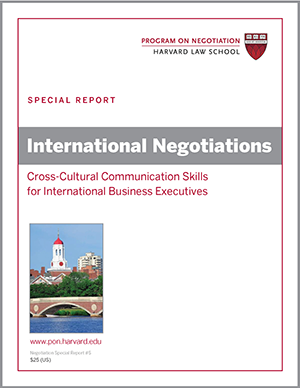
When preparing for cross-cultural communication in business negotiations, we often think long and hard about how our counterpart’s culture might affect what he says and does at the bargaining table.
That’s completely understandable, research suggests. The effectiveness of your communications with a negotiation counterpart may have a stronger impact on your results in cross-cultural negotiations than in same-culture negotiations, according to research published in the Journal of Applied Psychology by Leigh Anne Liu of Georgia State University, Chei Hwee Chua of the University of South Carolina, and Günter K. Stahl of the Vienna University of Economics and Business.
In their study of cross-cultural communication in business negotiations, the researchers looked at the quality of communication that American and Chinese individuals experienced during a negotiation simulation. Overall, the results showed that pairs of negotiators from different cultures had lower-quality communications and, consequently, reached worse outcomes than pairs from the same culture.
Interestingly, the relatively small number of cross-cultural pairs who overcame such communication difficulties actually achieved better outcomes than negotiators from the same culture. Why? With communication barriers out of the way, these cross-cultural pairs capitalized on their differences to reach more creative agreements, thus gaining an edge over same-culture negotiators.
The results suggest that there are great benefits to be gained from cross-cultural negotiations in international business, but it is important to manage cultural barriers to communication.
Weighing Cultural Differences
If you’re like most people, you wisely understand that cultural differences are likely to be a factor in negotiations. Books, films, television shows, and personal experience help to shape intercultural negotiating schemas, or templates that provide a quick, easy way of reading a foreign counterpart. Ideally, our intercultural negotiation schemas help us avoid blunders when negotiating with a foreign counterpart and also help us understand behavior that might otherwise be puzzling.
Though intercultural negotiating schemas can be useful, negotiators often give too much weight to them, according to research in Negotiation and Conflict Management Research by professors Wendi L. Adair of the University of Waterloo, Canada; Masako S. Taylor of Osaka Gakuin University in Japan; and Catherine H. Tinsley of Georgetown University.
The research team surveyed American professionals who had conducted business negotiations with Japanese counterparts, as well as Japanese professionals who had experience negotiating with Americans. The negotiators were asked to reflect on how they prepared for talks with people from their own culture and how they prepared for talks with people from the other culture (Japanese or American), as well as how such negotiations unfolded.
Interestingly, the participants typically adjusted their negotiating style too far toward the other side’s culture. Specifically, they expected a counterpart to negotiate as she would at home, not understanding that the counterpart would attempt to adjust her strategy to the foreign context as well. As a result, both sides tried too hard to adapt to their stereotypical ideas about the other side’s negotiating style. Ironically, this type of cultural sensitivity often led to culture clashes.
Research the Individual as Well as the Culture
When preparing for cross-cultural communication in business negotiations, how much emphasis should you place on culture? You don’t want to offend your counterpart with insensitive behavior, but focusing too much on culture can backfire.
Conduct background research on your counterpart’s culture, but spend even more time getting to know her as an individual, including her profession, work experience, education, areas of expertise, personality, and negotiating experience. And because your counterpart also needs to treat you as an individual rather than a stereotype, build in time for small talk before getting down to business.
The Benefits of Stress Reduction
In his research on cross-cultural communication in business negotiations, Columbia University professor Michael W. Morris has found that negotiators are more likely to behave according to cultural stereotypes when facing extreme demands on their attention.
In one study, participants were asked to judge an employee whose behavior had led to a negative result. When facing time pressure, American participants were more likely than Hong Kong participants to blame the individual rather than the situation for the problem—an American negotiating bias.
Emotional stress, deadlines, and accountability to others from your own culture can cause you to act in lockstep with cultural expectations rather than carefully analyzing the situation, according to Morris. Given the importance of international business communication, do what you can to reduce stress at the bargaining table, whether by taking breaks, extending deadlines, or asking a third party to help you resolve any differences that arise.
What lessons have you learned from your own experiences with cross-cultural communication in business negotiations?





Hello, Thank you for your comments, very interesting. Unfortunately we do not accept posts from outside authors.
Hello Admin,
Thank you for sharing your blog which enhances our knowledge and students career sector. I want to aware you towards our free online course named as Democracy and Development: Perspectives from Africa. This course will start on September 26, 2017.
In this course, you’ll learn about this remarkable experiment, and try to better understand both the opportunities and the challenges of democratic governance.
Student can get more information through the given link: https://www.freeeducator.com/free-online-course-on-democracy-and-development-perspectives-from-africa/